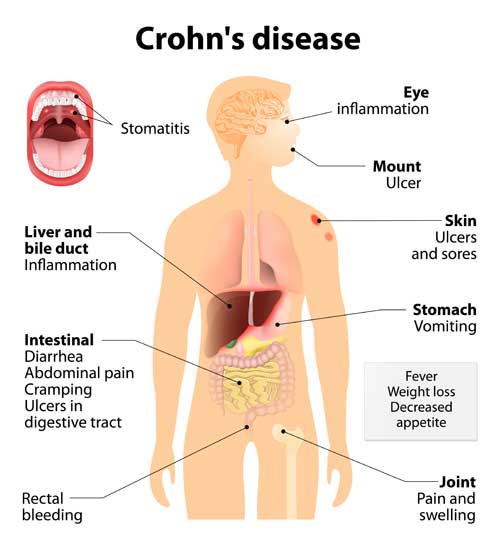
Updated: January 11, 2022

Tips for Living With Crohn's Disease
Being diagnosed with Crohn's disease can be a major life-changing event. It can affect the way you eat, exercise, and interact with others. Here are 10 tips for living with Crohn's disease.
1. Keep a Record
Tracking your symptoms is something your doctor will likely ask you to do. If you aren't doing it already, consider giving it a shot. Journaling can help identify patterns so you can match your symptoms with their triggers and learn to work around them. Discovering what triggers your symptoms can help give you the tools to cope with Crohn's disease. Tracking symptoms can also help you determine when you might experience a flare-up. The more information you can provide your doctor, the better. For more information and helpful tips to get started, take a look at this article.
2. Take a Look at Your Diet
When dealing with the digestive tract, your diet is the first place to look. Crohn's disease can affect your body's ability to digest food properly and absorb the nutrition it needs.1 Certain foods can increase your symptoms, especially if you're already in the middle of a flare-up. Other foods, such as those high in omega-3 fatty acids (found in fish), have an anti-inflammatory effect that can help with bowel inflammation. In general, make adjustments to your diet such as:
- Eat smaller and more frequent portions throughout the day.
- Limit dairy intake.
- Avoid greasy or fatty foods, especially in fried dishes.
- Limit high-fiber foods, especially those that are hard to digest, like popcorn, seeds, and nuts.
- Avoid spicy food.
Keep track of what you eat and talk to your doctor about it. They may recommend something else depending on your observations, or they may refer you to a nutritionist. For more in-depth information, check out UCSF's article, Nutrition Tips for Inflammatory Bowel Disease.

3. Avoid Caffeine and Alcohol
While not completely off the table, both caffeine and alcohol can aggravate Crohn's symptoms in some people. Everyone is different, so it may not affect you as badly as some. That being said, it is suggested that you practice moderation when consuming caffeine or alcohol of any kind. For more information, check out this article to see What to Drink and What Not to Drink With Crohn’s Disease.
4. Put Down the Cigarettes
Nicotine has an adverse effect on Crohn's disease.2 Those with Crohn's disease who smoke have more flare-ups and repeat surgeries than those who don't. They are also more likely to require immunosuppressive treatment. If you have Crohn's disease and smoke, consider cutting back or quitting altogether. Check out this article on The Effect of Nicotine on IBD.
5. Try To Relax
Crohn's disease can be painful, and it can be extremely stressful to manage the symptoms and not know when inflammation may strike. While stress doesn't cause Crohn's symptoms on its own, it can have a negative effect on the immune system, which then produces hormones that cause inflammation.3 It is impossible to have a completely stress-free life, but removing what stress you can from your day-to-day activities can help you relax more. Performing some slow breathing techniques, meditation, or a short yoga routine can also help you relax. Make sure you get enough sleep, too. Check out this article on Research-Backed Ways to Relieve Stress When You Have Crohn’s.

6. Exercise for the Endorphins
Exercise is helpful for a variety of reasons. For one thing, it releases endorphins that can lower your stress levels and improve your mood. For another, exercise helps the digestive tract work more efficiently and it can strengthen your muscles and bones. 4 If you don't have access to a gym, try a fitness app or talk to your doctor about exercises you can do. For more information, take a look at this article about the Best Exercise for Crohn's Disease.
7. Stay Hydrated
Dehydration occurs when you lose more fluid than you take in. If you have chronic diarrhea, it is easy to get dehydrated. To protect your body and your kidneys, make sure you hydrate regularly. Also, try not to take gulps but instead sip slowly. Take a look at this article, Why It’s Important to Stay Hydrated if You Have Crohn’s.
8. Watch Out for Your Bones
A common complication of Crohn's disease is osteoporosis. Some of the treatments or changes, such as limiting dairy in your diet, can weaken the integrity of your bones. Conditions like osteoporosis may develop as a result.5 In order to keep your bones strong and healthy, try to find nondairy sources of calcium, such as papayas, collard greens, kale, or soy and almond milk. You can also talk to your doctor about multivitamins or medications you can take to supplement your diet. For more information, check out Everyday Health's article How to Maintain Strong Bones When You Have Crohn’s.

9. Don't Isolate Yourself
Crohn's disease comes with some side effects that can be embarrassing in a public space. With symptoms like nausea, diarrhea, incontinence, or the urgent need for the bathroom, going out or seeing people can be nerve-wracking. Talking to people about your Crohn's disease can be even more so, and staying home alone might seem like the best idea. But isolating yourself can really send your mood into a spiral, especially if you're struggling with depression or anxiety. All this can result in stress that may aggravate your symptoms. Instead, find a support group specifically for Crohn's. Communicate to your existing friends and family as little or as much as you feel comfortable with. Check out these Crohn's disease tips for dealing with embarrassing symptoms in public settings.
10. Plan Ahead
A flare-up can happen at any moment, even if you do everything right. Being prepared can help put your mind at ease when you go out. Take a care packet with you when you go out that includes cleaning supplies such as wipes, a fresh pair of underwear, and any medications you may need. Locate bathrooms at your destination or along the way. Check out restaurant menus beforehand to make sure there is something for you to eat, or bring your own food to an outing. For more information, check out the Crohn's & Colitis Foundation's site for Navigating Daily Life with IBD.
What Is Crohn's Disease?
Crohn's disease is a type of inflammatory bowel disease, or IBD, where the digestive tract becomes inflamed. Crohn's disease can involve any part of the small or large intestine and sometimes involves multiple segments. Symptoms include abdominal pain or cramping, severe diarrhea, fatigue, reduced appetite and weight loss, blood in the stool, and mouth sores. The symptoms can range from mild to severe and usually develop little by little.6
There is currently no cure for Crohn's disease. Since the inflammation of the bowel is what triggers symptoms, treatment usually centers around reducing that inflammation. There is no single cure that works for everyone, but your doctor may recommend medications such as anti-inflammatory drugs, immune system suppressors, antibiotics, or acetaminophen. Other treatments include nutritional therapy and surgery.


Footnotes
- 1 Nutrition and Exercise With Crohn's Disease. Crohn's and Colitis. (2020). https://www.crohnsandcolitis.com/living-with-crohns-uc/crohns/diet-and-exercise. (Last Accessed June-29-2021)
- 2 Tresca, A. J. (2020, January 9). The Effect of Nicotine on IBD. Verywell Health. https://www.verywellhealth.com/smoking-nicotine-and-ibd-1941657. (Last Accessed June-28-2021)
- 3 Inflammation. Web MD. (n.d.). https://www.webmd.com/arthritis/about-inflammation. (Last Accessed June-29-2021)
- 4 Engels, M., Cross, R. K., & Long, M. D. (2017). Exercise in patients with inflammatory bowel diseases: current perspectives. Clinical and Experimental Gastroentology, 2018(11), 1–11. https://doi.org/https://doi.org/10.2147/CEG.S120816 (Last Accessed June-29-2021)
- 5 Ali, T., Lam, D., Bronze, M. S., & Humphrey, M. B. (2009, June 1). Osteoporosis in Inflammatory Bowel Disease. https://www.ncbi.nlm.nih.gov/pmc/articles/PMC2894700/. (Last Accessed June-29-2021)
- 6 Crohn's Disease. Mayo Clinic. (2020, October 13). https://www.mayoclinic.org/diseases-conditions/crohns-disease/symptoms-causes/syc-20353304. (Last Accessed June-28-2021)

Login and Registration Form